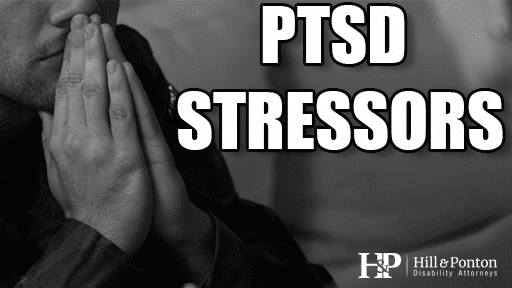We have been looking at claims for PTSD and what it takes to get service-connected. A claim for PTSD has three requirements: 1) a diagnosis of PTSD 2) an in-service stressor 3) a link between the diagnosis and in-service stressor. In our first post, we looked at what PTSD is and the first requirement. In the second post, we took a closer look at proving the in-service stressor. In this post, we will be looking at our third requirement, the link between the diagnosis of PTSD and the in-service stressor.
Nexus Link Between PTSD Diagnosis and In-Service Stressor
The third requirement for service connection of PTSD is a nexus link established by medical evidence between the current symptoms and the in-service stressor. This link has to be provided by a medical expert, it cannot be a lay opinion by an individual.
Establishing the link between the diagnosis of PTSD and the stressor is easier than the other two requirements for PTSD. Once you meet the first requirement showing you have a current diagnosis, it’s not hard to meet the third. The medical report containing the diagnosis of PTSD will usually also have information about the traumatic event that caused it and link the diagnosis to the event.
Examination reports should also always:
- Sufficiently describe symptomatology
- Identify or adequately describe the stressor
- Acknowledge and reconcile prior reports that don’t support a diagnosis of PTSD
- Conform to the Diagnostic Statistics Manual
It’s important that any private medical report also includes this information.
The standard for the medical nexus is the same as for the rest of the VA, the medical evidence in the record only needs to be in equipoise, or roughly even, on whether the veteran’s current symptoms are connected to the in-service stressor. This is the standard of “at least as likely as not.”
If after reviewing the evidence, the VA doubts whether the veteran’s stressor contributed to the PTSD symptoms, the medical reports must be returned for clarification. If the VA denies a claim for PTSD because it does not find the veteran’s nexus medical evidence convincing, it must say so in its decision and include an adequate statement of its reasons, along with identify the medical evidence in the record showing that the medical link was not proven.
As long as there is a clear relationship between an in-service stressor and a current diagnosis of PTSD, a veteran whose service records show no evidence of a mental disorder prior to service, can be entitled to service connection for PTSD. Even if PTSD develops many years after service, the VA has recognized that PTSD can develop hours, months, or even years after a stressor.
Once the veteran has submitted a medical diagnosis of PTSD, the VA is now limited in its ability to deny a claim for not showing a current disability. The record would have to contain medical evidence directly contradicting the diagnosis of PTSD for the VA to find the veteran doesn’t have a current disability. Then the VA must accept that the stressor described by the veteran to the examiner was medically sufficient to support a diagnosis of PTSD, and that the veteran’s symptoms were adequate for the examiner to diagnose PTSD. If the VA doubts whether the described stressors were sufficient to cause PTSD, or the adequacy of the symptomatology described in the diagnostic report, the VA must do one of two things: 1) put aside the doubts and accept the medical report as sufficient for rating purposes, or 2) return the medical report for clarification (not necessarily to the same examiner). If clarification isn’t provided when the report is sent back, then the VA must either return the examination report again or obtain independent medical evidence concerning the issue. Ultimately, the VA cannot reject a competent diagnosis of PTSD without an adequate statement of reasons or bases for its decision, and unless it can point to other medical evidence in the record to support its conclusion that the veteran does not have PTSD.
There are some cases where there are conflicting diagnoses in the record, where one expert opinion might conclude that the veteran has PTSD, and another expert concludes that the veteran either a) does not have PTSD, but does have another mental disorder, or b) does not have PTSD or any other mental disorder. When the evidence conflicts like this, the VA must analyze and weight the conflicting evidence in the record and making a finding one way or the other as to whether the veteran has PTSD. If the VA finds that the negative evidence outweighs the positive evidence of PTSD, the veteran can appeal. But if the BVA finds that the veteran also does not have PTSD, that decision will be upheld by a reviewing court as long as the decision is supported by medical evidence, has a plausible basis in the record, and is supported by an adequate statement of reasons and bases. The key to winning cases where there are conflicting diagnoses is to have the stronger evidence on your side.



